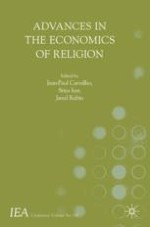2019 | OriginalPaper | Chapter
19. The Political and Economic Consequences of Religious Legitimacy
Author : Jared Rubin
Published in: Advances in the Economics of Religion
Publisher: Springer International Publishing
Activate our intelligent search to find suitable subject content or patents.
Select sections of text to find matching patents with Artificial Intelligence. powered by
Select sections of text to find additional relevant content using AI-assisted search. powered by
